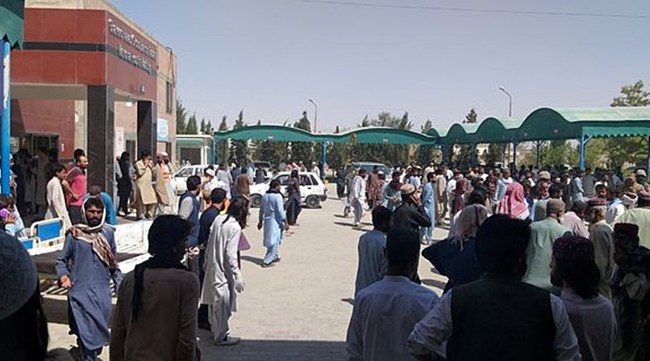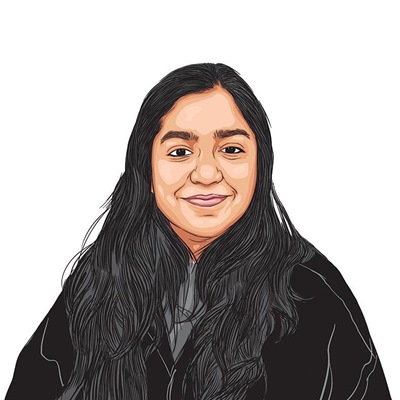Opinion View from the neighbourhood | Suicide bombings and delayed World Cup visas: What the Pakistani media is talking about
A weekly wrap-up of the issues being discussed and debated in India’s neighbourhood
 People gather outside the Mastung hospital, following a deadly suicide attack on a religious gathering in Balochistan province, Pakistan, September 29, 2023 in this handout image. (Reuters)
People gather outside the Mastung hospital, following a deadly suicide attack on a religious gathering in Balochistan province, Pakistan, September 29, 2023 in this handout image. (Reuters) Balochistan blasts
On September 29, there were “twin blasts” in Mastung and Hangu in the provinces of Balochistan and Khyber Pakhthunkhwa, respectively. Terrorists attacked an Eid Miladun Nabi event in the Mastung and Friday prayers in Hangu, near the KP city of Quetta. More than 55 people died in Mastung while five were reported dead in the Hangu incident — both attacks were believed to be suicide bombings.
Dawn (October 1) says, “Balochistan’s security situation over the past few decades has ignited apprehension, with the presence of both separatist and religiously inspired militancy… If this monster is not vanquished at this stage, it will create a security nightmare of significant proportions.” Daily Times (October 1) mentions the possible involvement of Delhi as believed by interim Interior Minister Sarfaraz Ahmed Bugti saying, “No concrete evidence has yet been furnished but Minister Sarfaraz Ahmed Bugti insists on India’s foreign intelligence community holding the ropes of those prancing around in a bid to destroy religious tolerance and peace in Balochistan.” The Nation (October 1) says, “the blast also casts light on what a massive security lapse it was and how the law and order situation is worsening and calling attention. We see a lack on the part of the intelligence apparatus as well.”
Student unions revival
The Quaid-i-Azam University in Islamabad recently announced its decision to revive student unions on campus. The Chief Justice of Pakistan, Qazi Faez Isa, also attended the meeting where the decision was taken and lent his support.
Both News International and Dawn mentioned that “Student unions were banned in the mid-1980s by Gen Zia’s military regime ostensibly to quell the violence on campuses fuelled by the warring factions of political parties.” News International (September 25) says, “Bringing back student unions would be one small way to show that citizens still have a right to organise and demand change. To keep a check on tyranny in all its forms, unions need to be strengthened again.” Dawn (September 26) agrees saying, “The QAU’s move should be welcomed, and other varsities should also consider reviving unions… Students have a democratic right to organise, manage their own affairs and liaise with varsity administrations.”
Saudi-Israel relations
This week, the Israeli Tourism Minister Haim Katz went to Saudi Arabia and Saudi ambassador to the Palestinians, Naif al-Sudairi, visited the Israeli-occupied West Bank. This resulted in Saudi Arabia and about six other nations recognising the Israeli state. But from the Saudi side, this normalisation of Saudi Arabia-Israel ties hinges on the realisation of a Palestinian state.
The Nation (September 25) says, “It is crucial for Muslim states to stay committed to the Palestinian cause. Despite acknowledging the existence of Israel, it is important for them to persist in providing diplomatic and humanitarian aid to Palestine, to avoid forsaking a trusted and enduring partner… It should be emphasised that Pakistan along with other nations should reconsider their positions in case Muslim states decide to establish diplomatic relations with Israel.” Express Tribune (September 25) speaks of the motivation behind this move, saying, “there are few more centrifugal forces that are galvanising this initiative, and one of them is the upcoming presidential election in the US. President Biden is eager to strike a jackpot in diplomacy by not only securing its strategic ally in the region, but by also wooing the Arab states, especially after a landmark deal brokered by China between the Saudis and Iran.”
Hope for the economy
A crackdown on hoarders and illegal dollar trade seems to be a factor in the Pakistani Rupee gaining some momentum towards normalcy. On Thursday, it was PR 287 to the dollar, which has raised the hopes of common people.
But Daily Times (September 29) remains sceptical of this improvement lasting, saying, “Perhaps, this historic moment could lay the foundation of what the optimists would call confidence in the home currency… [but] Unless and until Pakistan has a stable market and iron-clad reforms to balance out the foreign exchange supply and demand, no viable change should be expected.” Express Tribune (September 26) believes that “it will be difficult for the currency to hold ground for long if cushions of bailout from the Middle Eastern countries and China are not in the pipeline.” Hence, “The authorities will be better advised to keep afloat the market forces, and strictly adhere to the parity of open market and official rate of the currency as agreed with the IMF.”
Pakistan’s World Cup hurdle
The Pakistani cricket team landed in India recently after delayed visas and administrative obstacles were resolved. The warm reception by fans with cheers of “Babar bhai” and “Shaheen Afridi” points to the power of cricket in India-Pakistan ties. The media celebrated this moment in diplomacy and hopes for more of the same in the upcoming World Cup.
The Nation (September 29) says, “The warm welcome received by the Pakistani cricket team from Indian fans… is a testament to the power of sports in transcending boundaries and fostering goodwill. Such moments remind us of the boundless potential cricket has to promote peace, harmony, and positive interactions between India and Pakistan.” Express Tribune (September 27), however, has reservations about India delaying visas that led to Pakistani players having to cancel a team event. It says, “New Delhi may be trying to assert its newfound geopolitical importance, but such actions are not winning it any friends. Rather, they only underscore the Indian government’s petty politicisation of every subject under the sun.”





